|
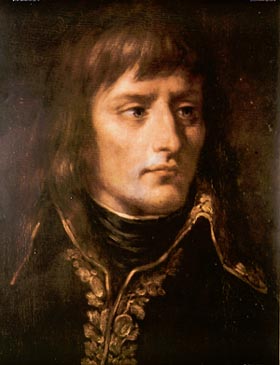 Napoleon Bonaparte was born on August 15, 1769 in Ajaccio on the Mediterranean island of Corsica. Through his military exploits and his ruthless efficiency, Napoleon rose from obscurity to become Napoleon I, Empereur des Francais (Emperor of the French). He is both a historical figure and a legend-and it is sometimes difficult to separate the two. The events of his life fired the imaginations of great writers, film makers, and playwrights whose works have done much to create the Napoleonic legend.
Napoleon Bonaparte was born on August 15, 1769 in Ajaccio on the Mediterranean island of Corsica. Through his military exploits and his ruthless efficiency, Napoleon rose from obscurity to become Napoleon I, Empereur des Francais (Emperor of the French). He is both a historical figure and a legend-and it is sometimes difficult to separate the two. The events of his life fired the imaginations of great writers, film makers, and playwrights whose works have done much to create the Napoleonic legend.
Napoleon decided on a military career when he was a child, winning a scholarship to a French military academy. His meteoric rise shocked not only France but all of Europe, and his military conquests threatened the stability of the world. Napoleon was one of the greatest military commanders in history. He has also been portrayed as a power hungry conqueror. Napoleon denied being such a conqueror. He argued that he was building a federation of free peoples in a Europe united under a liberal government. But if this was his goal, he intended to achieve it by taking power in his own hands. However, in the states he created, Napoleon granted constitutions, introduced law codes, abolished feudalism, created efficient governments and fostered education, science, literature and the arts.
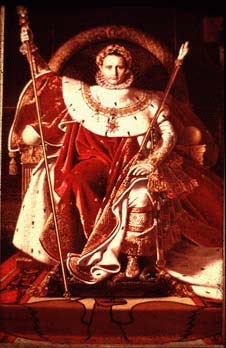 Emperor Napoleon proved to be an excellent civil administrator. One of his greatest achievements was his supervision of the revision and collection of French law into codes. The new law codes-seven in number-incorporated some of the freedoms gained by the people of France during the French revolution, including religious toleration and the abolition of serfdom. The most famous of the codes, the Code Napoleon or Code Civil, still forms the basis of French civil law. Napoleon also centralized France's government by appointing prefects to administer regions called departments, into which France was divided.
Emperor Napoleon proved to be an excellent civil administrator. One of his greatest achievements was his supervision of the revision and collection of French law into codes. The new law codes-seven in number-incorporated some of the freedoms gained by the people of France during the French revolution, including religious toleration and the abolition of serfdom. The most famous of the codes, the Code Napoleon or Code Civil, still forms the basis of French civil law. Napoleon also centralized France's government by appointing prefects to administer regions called departments, into which France was divided.
Napoleon's own opinion of his career is best stated in the following quotation:
"I closed the gulf of anarchy and brought order out of chaos. I rewarded merit regardless of birth or wealth, wherever I found it. I abolished feudalism and restored equality to all regardless of religion and before the law. I fought the decrepit monarchies of the Old Regime because the alternative was the destruction of all this. I purified the Revolution."
Napoleon and Josephine
"I awake full of you. Your image and the memory of last night's intoxicating pleasures has left no rest to my senses.
Sweet, incomparable Josephine, what a strange effect you have on my heart. Are you angry? Do I see you sad? Are you worried? My soul breaks with grief, and there is no rest for your lover; but how much the more when I yield to this passion that rules me and drink a burning flame from your lips and your heart? Oh! This night has shown me that your portrait is not you!
You leave at midday; in three hours I shall see you.
Meanwhile, my sweet love, a thousand kisses; but do not give me any, for they set my blood on fire.
B."
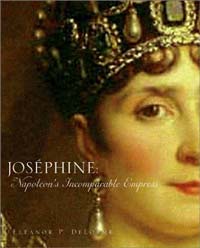 Marie-Josephe-Rose Tascher was born to Joseph and Rose-Marie Tascher in 1763 on the Caribbean island of Martinique, and was known as Rose or Yeyette as a child. Her family owned the plantation Trois-Ilets, but hurricanes destroyed their estate in 1766 and left them struggling financially.
Marie-Josephe-Rose Tascher was born to Joseph and Rose-Marie Tascher in 1763 on the Caribbean island of Martinique, and was known as Rose or Yeyette as a child. Her family owned the plantation Trois-Ilets, but hurricanes destroyed their estate in 1766 and left them struggling financially.
The Tascher family had three daughters, and it was hoped that they might make successful marriages to help their family's financial situation. The girls, however, were hampered by both a limited dowry, and a lack of a sophisticated Paris education.
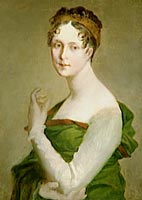 Joseph's sister Edmee, who lived in France, was the mistress of Francois de Beauharnais - a man of rank and money. When his health began to fail, Edmee arranged a marriage between Francois' son Alexandre and Joseph's twelve-year-old daughter Catherine, to ensure that Francois' money would continue to support her and help the struggling Tascher family as well. Unfortunately, while the letter announcing the arrangement was en route to Martinique, Catherine died. Joseph, eager to seize the marriage opportunity regardless of Catherine's death, instead accompanied his older daughter Rose to France to marry Alexandre.
Joseph's sister Edmee, who lived in France, was the mistress of Francois de Beauharnais - a man of rank and money. When his health began to fail, Edmee arranged a marriage between Francois' son Alexandre and Joseph's twelve-year-old daughter Catherine, to ensure that Francois' money would continue to support her and help the struggling Tascher family as well. Unfortunately, while the letter announcing the arrangement was en route to Martinique, Catherine died. Joseph, eager to seize the marriage opportunity regardless of Catherine's death, instead accompanied his older daughter Rose to France to marry Alexandre.
GULLAND: "When she came into the room, you'd probably be really drawn to her. She had great charisma, long eyelashes and big eyes. She wasn't a beauty, but she was really striking …She had a wonderful walk, very elegant, an indolent walk that really was enchanting. And she had a beautiful voice, what we would call a really sexy voice, very low and musical. So there was something about her aura that just enchanted people."
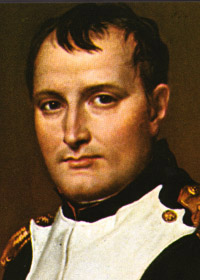 The substitution of brides was a shock to Alexandre, but nevertheless the ceremony took place in 1779. Theirs was not a happy marriage. Although they had two children, they spent the majority of their time living separate lives. The terror of the Revolution swept through France in 1789, and like most French nobility, Alexandre met his fate at the guillotine. Although Rose was also imprisoned and sentenced to death, she escaped death through sheer luck - Robespierre was overthrown before her day of execution arrived, and the Revolution was over.
The substitution of brides was a shock to Alexandre, but nevertheless the ceremony took place in 1779. Theirs was not a happy marriage. Although they had two children, they spent the majority of their time living separate lives. The terror of the Revolution swept through France in 1789, and like most French nobility, Alexandre met his fate at the guillotine. Although Rose was also imprisoned and sentenced to death, she escaped death through sheer luck - Robespierre was overthrown before her day of execution arrived, and the Revolution was over.
Life after the Revolution was difficult for Rose and her two children. To survive, she became the mistress of men who were in a position to help support her. It was during this time that she met Napoleon.
CHEVALLIER: " She's a real woman and that's what Napoleon said always about her, and that she's someone who doesn't leave people indifferent."
Napoleon was a Major-General in the French Army - a man with lofty ambition. To achieve his goals, though, he needed a rich wife. Josephine in turn saw him as a possible patron, and cultivated his friendship. They became lovers in 1795.
He proposed in January 1796, and they wed on March 9, 1796, just prior to his taking command of the army in Italy. She was hesitant at first to marry him, because he was "silent and awkward with women, was passionate and lively, though altogether strange in all his person."
Napoleon had great dreams for their future, and his wedding present to Rose - whom he had renamed Josephine - was a gold medallion inscribed with the words "To Destiny."
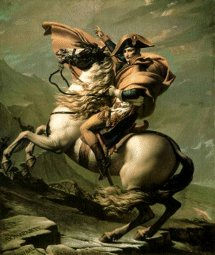 After his repeated pleadings, she followed him to Italy. During his Egyptian campaign of 1798-99, Napoleon heard that Josephine had for some time been conducting an affair with a handsome lieutenant, Hippolyte Charles. His initial anger softened (affairs were almost expected behavior at the time), and the two were reconciled. From this time onward, however, the relationship changed from extravagant passion on Napoleon's side to a mutual affection that survived the numerous affairs that Napoleon himself had during the course of their marriage.
After his repeated pleadings, she followed him to Italy. During his Egyptian campaign of 1798-99, Napoleon heard that Josephine had for some time been conducting an affair with a handsome lieutenant, Hippolyte Charles. His initial anger softened (affairs were almost expected behavior at the time), and the two were reconciled. From this time onward, however, the relationship changed from extravagant passion on Napoleon's side to a mutual affection that survived the numerous affairs that Napoleon himself had during the course of their marriage.
As Napoleon conquered Europe and came to dominate the political scene in France, so Josephine maintained his houses and state palaces--and herself--at an appropriate level of splendor. She responded to her husband's whims--his love of makeup, for example, and his horror of perfume--and he paid her enormous bills for clothes, shoes, jewelry, and objets d'art. On state visits to cities throughout the nation she was always generous, kindly, and beguiling. As Napoleon himself once said,
"I only win battles; Josephine wins hearts for me."
After May 1804, when Napoleon was declared emperor, Josephine's position seemed secure. But Napoleon wanted an heir to rule after him. There was none. Josephine, increasingly fearful of being displaced as the empress, struggled against gossip and foreboding. She could be overwhelmed by weeping when Napoleon was away leading military campaigns. But Napoleon saw things very differently. From his point of view,
"the wife was made for the husband, the husband for his country, his family, and glory."
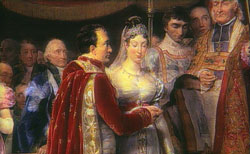 On December 15, 1809, Napoleon had his marriage to Josephine annulled. She retired to Malmaison, her private and best-loved residence. The letters that Napoleon wrote to her there just after the annulment revel tenderness and his sense of loss. He told how he ad visited one of their palaces, the Tuileries, scene of the street battle in October 1795 that first brought them together:
"That great palace seemed empty to me and I felt lost in it."
On December 15, 1809, Napoleon had his marriage to Josephine annulled. She retired to Malmaison, her private and best-loved residence. The letters that Napoleon wrote to her there just after the annulment revel tenderness and his sense of loss. He told how he ad visited one of their palaces, the Tuileries, scene of the street battle in October 1795 that first brought them together:
"That great palace seemed empty to me and I felt lost in it."
In April 1814 Napoleon was forced to abdicate with his dreams of empire in ruins about him. The following month Josephine died at age 51. Although Josephine came to love her husband with a singleminded devotion, the intense passion in this relationship was always Napoleon's. In his final exile on St. Helena, Napoleon wrote:
"Josephine is the only woman I have ever truly loved. She reigns in my heart and I mourn for her."
|